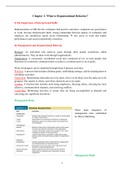Chapter 1: What is Organizational Behavior?
I) The Importance of Interpersonal Skills
Implementation of OB into the workspace had positive outcomes: companies are good places
to work, develop interpersonal skills, strong relationship between quality of workplace and
employee job satisfaction (good social relationships → less stress at work and higher
performance) and social responsibility awareness
II) Management and Organizational Behavior
Manager: An individual who achieves goals through other people (sometimes called
administrators). They do their work through organizations.
Organization: A consciously coordinated social unit, composed of two or more people, that
functions on a relatively continuous basis to achieve a common goal or set of goals.
Work of managers can be identified through those 4 primary activities:
Planning: A process that includes defining goals, establishing strategy, and developing plans to
coordinate activities.
Organizing: Determining what tasks are to be done, who is to do them, how the tasks are to be
grouped, who reports to whom, and where decisions are to be made.
Leading: A function that includes motivating employees, directing others, selecting the most
effective, communication channels, and resolving conflicts.
Controlling: Monitoring activities to ensure they are being accomplished as planned and
correcting any significant deviations.
Management Roles
Three main categories of
management roles established
by Henry Mintzberg.
Management Skills
1
,Managers need skills to achieve their goals and become a well-rounded manager
Technical Skills: The ability to apply specialized knowledge or expertise (technical skills
learned through formal education).
Human Skills: The ability to work with, understand, and motivate other people, both
individually and in groups (listen to the needs of others).
Conceptual Skills: The mental ability to analyze and diagnose complex situations.
Effective versus Successful Managerial Activities
“Do managers who move up most quickly in an organization do the same activities and with
the same emphasis as managers who do the best job?” You might think the answer is yes, but
that’s not always the case…
4 managerial activities:
Traditional Management: Decision making, planning and controlling
Communication: Exchanging routine information and processing paperwork
Human Resource Management: Motivating, disciplining, managing conflict, staffing, and
training.
Networking: Socializing, politicking, and interacting with others
Organizational Behavior (OB):
A field of study that investigates
the impact individuals, groups,
and structure have on behavior
within organizations, for the
purpose of applying such
knowledge toward improving
an organization’s effectiveness.
Generally talking OB is the
study of what people do in an organization and the way their behavior affects the organization’s
performance.
III) Complementing Intuition with Systematic Study
Behavior is not random because it allows predictability. The systematic study of behavior is a
reasonable way to make accurate predictions.
Systematic Study: Looking at relationships, attempting to attribute causes and effects, and
drawing conclusions based on scientific evidence.
2
,Evidence-based management (EBM): The basing of managerial decisions on the best available
scientific evidence (vast majority of managerial decisions are made “on the fly” with little to
no systematic study of available evidence).
Intuition: An instinctive feeling not necessarily supported by research.
Big Data
Big data can be referred to as the extensive use of statistical compilation and analysis.
Extremely large data sets that may be analyzed computationally to reveal patterns, trends, and
associations, especially relating to human behavior and interactions.
- Background: Since it was possible to gather information and track users over the internet
to take advantage of the customers using their preferences to capture their attention on
ads → create a targeted marketing strategy.
- Current Usage: Data analysis includes predicting any event, how much risk is incurred
and preventing catastrophes (Insurance firms for example predict behaviors to assess
risks and online companies use data to predict where and when customers will be likely
to buy a product/service).
- New Trends: It is predictable that in the future more and more people’s work will rely
on technologically advanced devices.
- Limitations: Privacy issues have increased with all the capabilities of handling big data
(surveillance instruments → can result in change of citizen behavior)
IV) Disciplines that contribute to
the OB Field
Psychology: The science that seeks to
measure, explain, and sometimes
change the behavior of humans and
other animals (study of fatigue,
working conditions affecting job
performance, motivation, decision-
making, training, leadership…)
Social Psychology: An area of
psychology that blends concepts from
psychology and sociology to focus on
the influence of people on one another
(important contributions to the study
of group behavior, power and conflict)
Sociology: The study of people in
relation to their social environment or
culture.
3
, Anthropology: The study of societies to learn about human beings and their activities (learn
about the fundamental values, attitudes and behaviors among people in different countries and
organizations).
V) There are few absolutes in OB
Generalizations that can be made in physics, chemistry or astronomy can’t be made for the
study of organizational behavior of humans. Every human is different and has different goals
and beliefs. For example, not everybody is motivated by money.
This means that OB concepts must reflect situational or contingency conditions.
Contingency variables: Situational factors: variables that moderate the relationship between
two or more variables.
VI) Challenges and Opportunities for OB
All those changes have resulted in new options for workers and they end up choosing between
several opportunities.
Economic Pressures
The crisis of 2008 was a good way for managers to prove if there were good or bad. Sometimes
the difference between good and bad management can be the difference between profit and loss
or, ultimately between business survival and failure. Managing when times are good is as hard
as when times are bad.
Continuing Globalization
Organizations are no longer constrained by national borders. Some companies mostly sell their
products to other countries that the one they have been produced in and employs workers
abroad. The world has become a global village.
- Increased foreign assignments: transferring employees operating division in another
country. You will have to understand the foreign culture and its environment to be
successful there and to get the opportunity of implementing yourself.
4





